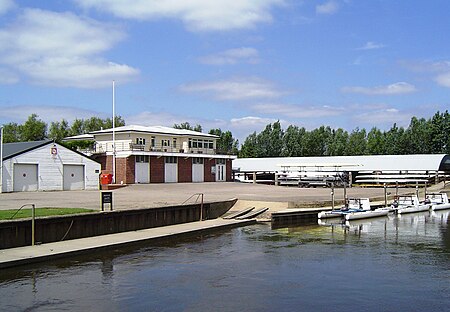The Joint European Torus (JET) was a magnetically confined plasma physics experiment, located at Culham Centre for Fusion Energy in Oxfordshire, UK. Based on a tokamak design, the fusion research facility was a joint European project with a main purpose of opening the way to future nuclear fusion grid energy. At the time of its design JET was larger than any comparable machine.
JET was built with the hope of reaching scientific breakeven where the fusion energy gain factor Q =1.0. It began operation in 1983 and spent most of the next decade increasing its performance in a lengthy series of experiments and upgrades. In 1991 the first experiments including tritium were made, making JET the first reactor in the world to run on the production fuel of a 50–50 mix of tritium and deuterium. It was also decided to add a divertor design to JET, which occurred between 1991 and 1993. Performance was significantly improved, and in 1997 JET set the record for the closest approach to scientific breakeven, reaching Q = 0.67 in 1997, producing 16 MW of fusion power while injecting 24 MW of thermal power to heat the fuel.Between 2009 and 2011, JET was shut down to rebuild many of its parts, to adopt concepts being used in the development of the ITER project in Saint-Paul-lès-Durance, in Provence, southern France. In December 2020, a JET upgrade commenced using tritium, as part of its contribution to ITER. On 21 December 2021, using deuterium-tritium fuel, JET produced 59 megajoules during a five-second pulse, beating its previous 1997 record of 21.7 megajoules, with Q = 0.33.In November 2023, a petition asking that JET not be closed was started, with scientists fearing a research time gap and personnel loss between JET's closure and the start of ITER's operations.
JET finished operations in December 2023, with decommissioning expected to last until 2040.









